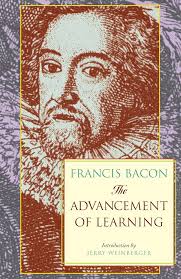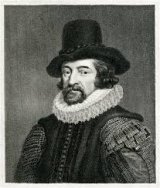The Advancement of Learning Page #39
The Advancement of Learning, published by Francis Bacon in 1605, is a foundational text in the history of science and philosophy. In this work, Bacon advocates for empirical research and the systematic organization of knowledge, laying the groundwork for the scientific method. The book critiques existing scholarly practices and proposes a new approach to learning based on observation and experimentation. It marks a significant shift towards modern scientific inquiry.
- Year:
- 1605
- 1,170 Views
Submitted by acronimous on August 11, 2024
Modified by acronimous on August 11, 2024
shall speak now of such knowledges as reason produceth (for that extendeth to all philosophy), but of such knowledges as do handle and inquire of the faculty of reason: so as poesy had his true place. As for the power of the imagination in nature, and the manner of fortifying the same, we have mentioned it in the doctrine De Anima, whereunto most fitly it belongeth. And lastly, for imaginative or insinuative reason, which is the subject of rhetoric, we think it best to refer it to the arts of reason. So therefore we content ourselves with the former division, that human philosophy, which respecteth the faculties of the mind of man, hath two parts, rational and moral. (2) The part of human philosophy which is rational is of all knowledges, to the most wits, the least delightful, and seemeth but a net of subtlety and spinosity. For as it was truly said, that knowledge is pabulum animi; so in the nature of men’s appetite to this food most men are of the taste and stomach of the Israelites in the desert, that would fain have returned ad ollas carnium, and were weary of manna; which, though it were celestial, yet seemed less nutritive and comfortable. So generally men taste well knowledges that are drenched in flesh and blood, civil history, morality, policy, about the which men’s affections, praises, fortunes do turn and are conversant. But this same lumen siccum doth parch and offend most men’s watery and soft natures. But to speak truly of things as they are in worth, rational knowledges are the keys of all other arts, for as Aristotle saith aptly and elegantly, “That the hand is the instrument of instruments, and the mind is the form of forms;” so these be truly said to be the art of arts. Neither do they only direct, but likewise confirm and strengthen; even as the habit of shooting doth not only enable to shoot a nearer shoot, but also to draw a stronger bow. (3) The arts intellectual are four in number, divided according to the ends whereunto they are referred—for man’s labour is to invent that which is sought or propounded; or to judge that which is invented; or to retain that which is judged; or to deliver over that which is retained. So as the arts must be four—art of inquiry or invention; art of examination or judgment; art of custody or memory; and art of elocution or tradition. XIII. (1) Invention is of two kinds much differing—the one of arts and sciences, and the other of speech and arguments. The former of these I do report deficient; which seemeth to me to be such a deficience as if, in the making of an inventory touching the state of a defunct, it should be set down that there is no ready money. For as money will fetch all other commodities, so this knowledge is that which should purchase all the rest. And like as the West Indies had never been discovered if the use of the mariner’s needle had not been first discovered, though the one be vast regions, and the other a small motion; so it cannot be found strange if sciences be no further discovered, if the art itself of invention and discovery hath been passed over. (2) That this part of knowledge is wanting, to my judgment standeth plainly confessed; for first, logic doth not pretend to invent sciences, or the axioms of sciences, but passeth it over with a cuique in sua arte credendum. And Celsus acknowledgeth it gravely, speaking of the empirical and dogmatical sects of physicians, “That medicines and cures were first found out, and then after the reasons and causes were discoursed; and not the causes first found out, and by light from them the medicines and cures discovered.” And Plato in his “Theætetus” noteth well, “That particulars are infinite, and the higher generalities give no sufficient direction; and that the pith of all sciences, which maketh the artsman differ from the inexpert, is in the middle propositions, which in every particular knowledge are taken from tradition and experience.” And therefore we see, that they which discourse of the inventions and originals of things refer them rather to chance than to art, and rather to beasts, birds, fishes, serpents, than to men. “Dictamnum genetrix Cretæa carpit ab Ida, Puberibus caulem foliis et flore camantem Purpureo; non illa feris incognita capris Gramina, cum tergo volucres hæsere sagittæ.” So that it was no marvel (the manner of antiquity being to consecrate inventors) that the Egyptians had so few human idols in their temples, but almost all brute: “Omnigenumque Deum monstra, et latrator Anubis, Contra Neptunum, et Venerem, contraque Minervam, &c.” And if you like better the tradition of the Grecians, and ascribe the first inventions to men, yet you will rather believe that Prometheus first stroke the flints, and marvelled at the spark, than that when he first stroke the flints he expected the spark; and therefore we see the West Indian Prometheus had no intelligence with the European, because of the rareness with them of flint, that gave the first occasion. So as it should seem, that hitherto men are rather beholden to a wild goat for surgery, or to a nightingale for music, or to the ibis for some part of physic, or to the pot-lid that flew open for artillery, or generally to chance or anything else than to logic for the invention of arts and sciences. Neither is the form of invention which Virgil describeth much other: “Ut varias usus meditande extunderet artes Paulatim.” For if you observe the words well, it is no other method than that which brute beasts are capable of, and do put in ure; which is a perpetual intending or practising some one thing, urged and imposed by an absolute necessity of conservation of being. For so Cicero saith very truly, Usus uni rei deditus et naturam et artem sæpe vincit. And therefore if it be said of men, “Labor omnia vincit Improbus, et duris urgens in rebus egestas,” it is likewise said of beasts, Quis psittaco docuit suum χαιρε? Who taught the raven in a drought to throw pebbles into a hollow tree, where she spied water, that the water might rise so as she might come to it? Who taught the bee to sail through such a vast sea or air, and to find the way from a field in a flower a great way off to her hive? Who taught the ant to bite every grain of corn that she burieth in her hill, lest it should take root and grow? Add then the word extundere, which importeth the extreme difficulty, and the word paulatim, which importeth the extreme slowness, and we are where we were, even amongst the Egyptians’ gods; there being little left to the faculty of reason, and nothing to the duty or art, for matter of invention. (3) Secondly, the induction which the logicians speak of, and which seemeth familiar with Plato, whereby the principles of sciences may be
Translation
Translate and read this book in other languages:
Select another language:
- - Select -
- 简体中文 (Chinese - Simplified)
- 繁體中文 (Chinese - Traditional)
- Español (Spanish)
- Esperanto (Esperanto)
- 日本語 (Japanese)
- Português (Portuguese)
- Deutsch (German)
- العربية (Arabic)
- Français (French)
- Русский (Russian)
- ಕನ್ನಡ (Kannada)
- 한국어 (Korean)
- עברית (Hebrew)
- Gaeilge (Irish)
- Українська (Ukrainian)
- اردو (Urdu)
- Magyar (Hungarian)
- मानक हिन्दी (Hindi)
- Indonesia (Indonesian)
- Italiano (Italian)
- தமிழ் (Tamil)
- Türkçe (Turkish)
- తెలుగు (Telugu)
- ภาษาไทย (Thai)
- Tiếng Việt (Vietnamese)
- Čeština (Czech)
- Polski (Polish)
- Bahasa Indonesia (Indonesian)
- Românește (Romanian)
- Nederlands (Dutch)
- Ελληνικά (Greek)
- Latinum (Latin)
- Svenska (Swedish)
- Dansk (Danish)
- Suomi (Finnish)
- فارسی (Persian)
- ייִדיש (Yiddish)
- հայերեն (Armenian)
- Norsk (Norwegian)
- English (English)
Citation
Use the citation below to add this book to your bibliography:
Style:MLAChicagoAPA
"The Advancement of Learning Books." Literature.com. STANDS4 LLC, 2025. Web. 10 Mar. 2025. <https://www.literature.com/book/the_advancement_of_learning_3165>.








Discuss this The Advancement of Learning book with the community:
Report Comment
We're doing our best to make sure our content is useful, accurate and safe.
If by any chance you spot an inappropriate comment while navigating through our website please use this form to let us know, and we'll take care of it shortly.
Attachment
You need to be logged in to favorite.
Log In